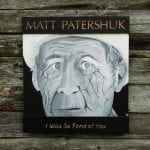Review By Douglas Heselgrave
It’s not so easy writing about nothing.
I woke up this morning at 4:49 AM thinking about Patti Smith. Or, not thinking about her so much as the line above that opens ‘M Train’ delivered to her by an old cowpoke in a dream. I lay in bed wondering if she realized how perfectly the words embody all that is so great about the writer she has become.
In ‘M Train’ Patti Smith explores the vibratory power of empty space that allows us to shape form from emptiness, and memory out of transience. It is a book quite unlike anything else I have recently read and thumbing through it a second time, I thought it kind of funny how after so many recordings, performances and books of poetry, Patti Smith has found her truest, most confident and beautiful voice through prose. This might not be too much of a revelation for those who have read ‘Just Kids’, her 2010 memoir about her early life and relationship with the photographer, Robert Mapplethorpe. I can still remembering devouring the book in one long sitting and thinking that Smith had finally hit her stride and found the perfect vehicle for all she wanted to express.
The good news is that ‘M Train’ is ten times the book that ‘Just Kids’ was. It’s difficult to explain why, but I think it has something to do with the degree of separation Smith has achieved. Here’s what I mean. When Neil Young’s autobiography ‘Waging heavy Peace’ came out a few years ago, I couldn’t wait to read it, but the further I got into it, the more disappointed I became. There was too much obfuscation and pussyfooting. Young was writing a book about his life, but he didn’t seem to want to tell us much. But, when he wrote another book, ‘Special Deluxe’, ostensibly about dogs and cars, I couldn’t put it down. Now, I have almost no interest in cars, but it didn’t matter. For Young, the cars were just a touchstone and when he wrote about them he revealed far more about himself than he did in his autobiography. And, the writing was so much better.
The same kind of slight separation or removal works in M Train’s favour. When Patti writes about places, whole worlds of imagery open up and self-consciousness – always a feature of Smith’s work – drops away and we are left only to appreciate the grace and power of her prose, without the intervention of rock star ego. The writing she gives us is true and unwatered, and in every instance lives up to the challenge posed by the old cowpoke in the dream.
‘M Train’ is written in everyday language and Smith almost never defers to the admonitions, incantations or abrasive calls to the ancients of literature and philosophy as she does so often in her music and poetry. The book is more powerful for this and the more deeply I read into it, the more I enjoyed experiencing an elegance, grace and humility that is often absent from Smith’s music. Truthfully, as much as I have loved, listened to and collected all of her works for the last four decades, I have found much of her music – other than the lovely ‘Coral Sea’ from 2006 – difficult to return to. It’s hard to know why exactly. Rock and roll is a powerful animal that cannot be approached sheepishly and it must get harder or weirder as the years pass. Like a sadhu bent by the sun, privations and the burning chillum, we are shaped by our experiences and not many of us are Keith Richards, born rock and roll lightning rod, who like an old bent banyen tree becomes somehow more beautiful every year.
‘M Train’ is ostensibly about locations and the stories they tell and the gifts they offer. But, more than that it is about the act of writing. Writing as mystical activity, but also writing as work, as frustration, as scribbling with no destination or end insight. Hints and scraps of biography aside – who cares what is true in what she writes? – what is most essential about ‘M Train’ is the hinted subtext that asserts that, really, with just the tiniest portal open, in the right frame of mind, it doesn’t matter what we write about. It’s a matter of perception. The vehicle doesn’t matter. After all, ‘it’s all one long song’ as Neil Young said. I think of how Patti followed her passion to bring back a Gitanes box full of stones from a prison in French Guiana for Jean Genet to rest his feet on, and I wonder how many artists have followed paths that Patti Smith set them upon.
It’s not so easy writing about nothing.
What are my own memories of Patti Smith? The stones I would bring her in a little Gitanes box.
Listening to ‘Radio Ethiopia’ in a broken down 1972 Pontiac Ventura on a rainy New Year’s Day in 1985 waiting for a tow truck to come up a muddy logging road to rescue me and a sleeping stranger in the back seat.
In concert at Vancouver’s Commodore Ballroom in 2005. The woman standing beside me in the mosh pit yelling, ‘Patti – Keep talking and don’t start singing until I get back from taking a pee!” Without skipping a beat, Patti, ‘Stay where you are! I can’t tell you how many times I’ve pissed and come in my pants at a rock show.’ The woman didn’t leave and stayed put until the final encore.
At the Book Store Café in Jogyakarta, Java in 1991. Every morning while we ate breakfast, ‘Dream Of Life’ played over and over again. Bent, distorted and whirring, ‘People Have The Power’ came to be – along with those two similarly stretched wonky Gamelan tapes – the sound of my Indonesia. I bought a CD of ‘Dream Of Life’ when I returned home to Canada. It was wonderful, but somehow, without the whirring and distortion, it didn’t sound quite right.
Holding onto this memory, I picked up my copy of ‘M Train’ and wrapped it carefully in an old t shirt and slid it under my bed where it’s waiting. It is one of the few books written by a musician – or anyone else for that matter – that I can’t wait to re-read.




